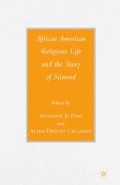Abstract
This chapter assumes the political reality that biblical stories and traditions have been used by dominant groups throughout ancient and modern history to further political and social agendas and to oppress and belittle certain groups of people. While realism speaks about what is perceived to be real, the faith of African American Christians speaks to another and a deeper reality, one that did not develop from conferring with flesh and blood.1 This deeper reality has a spiritual source, but it motivates political, social, and economic efforts toward freedom, liberation, and justice. It works to silence and dethrone the cultural creations intended to undermine, enslave, oppress, and victimize others. While the biblical story of Nimrod and the Curse of Ham have been employed for centuries to demean and enslave nondominant groups and people of color, there is a much stronger spiritual dynamic at work in history that is overthrowing human efforts to enslave others through counterfeit uses of the holy scriptures.
Access this chapter
Tax calculation will be finalised at checkout
Purchases are for personal use only
Preview
Unable to display preview. Download preview PDF.
Notes
For fuller discussion of pastoral counseling as a political process, see Edward P. Wimberly, African American Pastoral Care and Counseling as Political Processes (Cleveland, OH: Pilgrim Press, 2006).
Cain Hope Felder, “Race, Racism, and the Biblical Narratives,” in Stony the Road We Trod: African American Biblical Interpretation, ed. Cain Hope Felder (Minneapolis, MN: Fortress Press, 1991), 128–129.
Charles B. Copher, “The Black Presence in the Old Testament,” in Stony the Road We Trod: African American Biblical Interpretation, ed. Cain Hope Felder (Minneapolis, MN: Fortress Press, 1991), 146–164.
Charles B. Copher “Three Thousand Years of Biblical Interpretation with Reference to Black Peoples,” in African American Religious Studies: An Interdisciplinary Anthology, ed. Gayraud Wilmore (Durham, NC: Duke University Press, 1989), 105–128.
Copher, “The Black Presence in the Old Testament,” 146–147. See also Stephen R Haynes, Noah’s Curse: The Biblical Justification ofAmerican Slavery (New York: Oxford University Press, 2002);
Michael Joseph Brown, Blackening of the Bible: The Aims of African American Biblical Scholarship (New York: Trinity Press International, 2004), 24–53.
Anthony B. Pinn, “Embracing Nimrod’s Legacy: The Erotic, the Irreverence of Fantasy, and the Redemption of Black Theology,” in Loving the Body: Black Religious Studies and the Erotic, ed. Anthony B. Pinn and Dwight N. Hopkins (New York: Palgrave Macmillan, 2004), 168.
See Hans W. Frei, Theology and Narrative Selected Essays, ed. George Husinger and William C. Placher (New York: Oxford University Press, 1993), 16–17.
Thomas Hoyt, “Interpreting Biblical Scholarship for the Black Church Tradition,” in Stoney the Road We Trod: African American Biblical Interpretation, ed. Cain Hope Felder (Minneapolis, MN: Fortress Press, 1991), 27.
Edward P. Wimberly, African American Pastoral Care and Counseling as Political Processes (Cleveland, OH: Pilgrim Press, 2006).
Erik H. Erikson, Childhood and Society (New York: W.W. Norton and Co., 1963), 241–246.
Romney M. Moseley, Becoming a Self Before God: Critical Transformations (Nashville, TN: Abingdon Press, 1991), 70.
See Bernard Spilka, Jr., Ralph W. Hood, Bruce Hunsberger, and Richard Gorsuch, The Psychology of Religion (New York: Guilford Press, 1996), 362.
Brian K. Blount, Cultural Interpretation: Reorienting New Testament Criticism (Minneapolis, MN: Fortress Press, 1995), 32–33.
Editor information
Editors and Affiliations
Copyright information
© 2008 Anthony B. Pinn and Allen Dwight Callahan
About this chapter
Cite this chapter
Wimberly, E.P. (2008). Beyond the Curse of Noah: African American Pastoral Theology as Political. In: Pinn, A.B., Callahan, A.D. (eds) African American Religious Life and the Story of Nimrod. Black Religion/Womanist Thought/Social Justice. Palgrave Macmillan, New York. https://doi.org/10.1057/9780230610507_14
Download citation
DOI: https://doi.org/10.1057/9780230610507_14
Publisher Name: Palgrave Macmillan, New York
Print ISBN: 978-1-349-53050-2
Online ISBN: 978-0-230-61050-7
eBook Packages: Palgrave Religion & Philosophy CollectionPhilosophy and Religion (R0)

